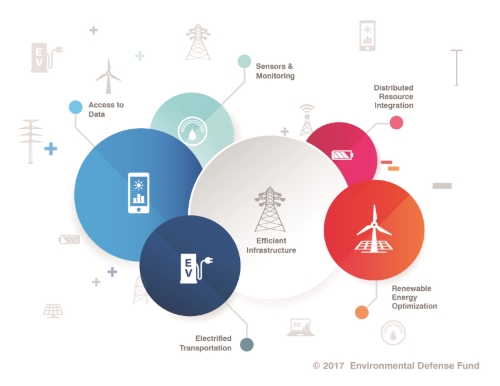NEW REPORT: A Modern Electric Grid is the Foundation for Climate Change Progress
Highlighting six key areas, EDF report provides a useful roadmap for a clean, modern grid
(WASHINGTON D.C. – December 6, 2017) Making smart investments to upgrade our outdated electric grid is foundational for climate change progress, according to a new report released today by Environmental Defense Fund (EDF). The report shows how a modern grid can help the U.S. mitigate and adapt to climate change and accelerate the clean energy future.
“Upgrading our electricity system is critical to fighting climate change and keeping the lights on for more people during future storms,” said Ronny Sandoval, EDF grid modernization director and author of the report. “Many utilities across the country are now investing in grid upgrades. In addition to improving resiliency, these investments should make how our country produces, moves and uses electricity cleaner, cheaper and more efficient.”
The electric grid Americans rely on each day to power their lives and economy is in need of an upgrade. After record-breaking hurricane and wildfire seasons, that need – and the urgency to meet it – has never been clearer. EDF’s new report, Grid Modernization: The foundation for climate change progress, highlights six ways a modern grid that relies on cleaner energy and harnesses new technologies can cut pollution, save customers money and boost our economy:
- Sensing and monitoring for enhanced system awareness
- Intelligent integration of diverse distributed resources
- Maximizing the role of renewable energy
- Electrification of transportation systems
- Access to actionable energy data
- Efficient transmission and distribution management

With more than 3 million members, Environmental Defense Fund creates transformational solutions to the most serious environmental problems. To do so, EDF links science, economics, law, and innovative private-sector partnerships to turn solutions into action. edf.org
Media Contact
Latest press releases
-
Trump EPA Finalizes Weak Rule to Reduce Dangerous Air Pollution from New Gas-Burning Power Plants, Ignores Health Benefits and Lives Saved from Pollution Reduction
January 12, 2026 -
Arizona Governor Announces New Groundwater Active Management Area to Protect Community
January 12, 2026 -
Court Rules Trump DOE Violated the Constitution When It Cancelled Clean Energy Funding in Specific States
January 12, 2026 -
Gov. Newsom’s Can-Do Budget Proposal for Zero-Emission Vehicles Will Reduce Costs and Deliver Enormous Benefits for Californians
January 9, 2026 -
Trump EPA Takes Final Steps on Rule Expected to Overturn Endangerment Finding, Clean Vehicle Standards
January 9, 2026 -
California Shows Climate Policy is an Affordability Solution, Needed Now More than Ever
January 8, 2026










